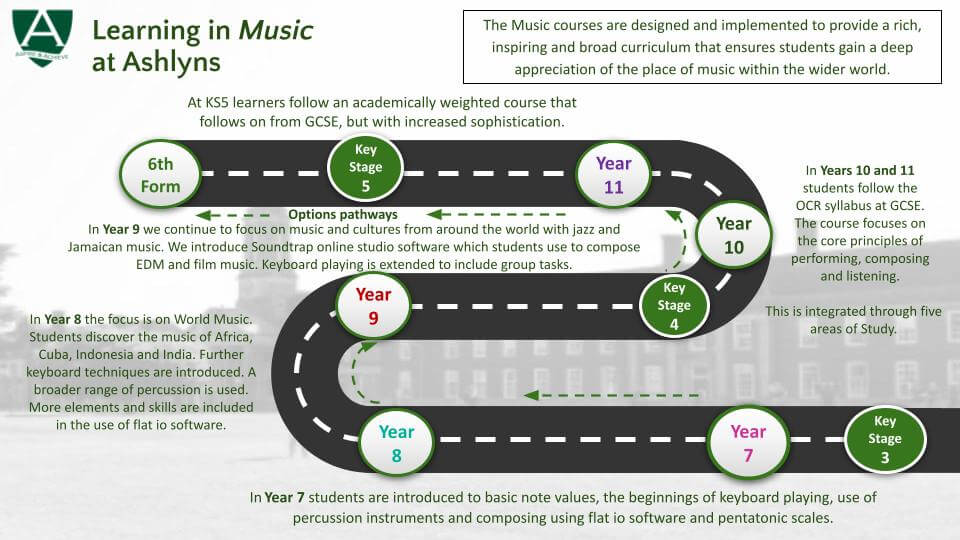Music
We all experience music in some form in our daily lives. The Music Department at Ashlyns recognises the importance of this and aims to develop our students’ understanding by experiencing and investigating a wide range of genres through the three key areas of performing, composing, and listening and appraising. Those who wish to can then progress to study the subject at GCSE and A Level.
Music Development Plan 2024/25.

Key Stage 3
Our Key Stage 3 curriculum is designed to be accessible to all students regardless of their musical background or ability. The Music Department is housed in a dedicated music block which has two classrooms and 10 practice rooms. In addition, there is a keyboard room in the main building. Lessons alternate in half term blocks between these two areas. The music block is the focus for percussion work and is resourced with an excellent range of percussion including class sets of African drums, xylophones, metallophones and ukuleles. Lessons in the keyboard room focus, naturally, on keyboard playing.
Through practical involvement the students discover a wide range of musical styles from the ‘inside’ and this learning is consolidated through focused, guided listening to their performances and compositions, and to the music of established artists and composers.
Year 7
- Note values and rhythm
- Mediaeval music
- The power of the pentatonic
- The orchestra
- Minimalism
Year 8
- African music
- Cuban music
- Indonesian music
- Indian music
- The ukulele
- 12 Bar blues
Year 9
- Jazz
- Jamaican music
- Music in film
- Updating the classics
- Popular music
- Electronic Dance Music
Key Stage 4
Music is an option subject at GCSE. The GCSE course is open to all musicians, from all musical backgrounds, and of all musical abilities. Students wishing to take the music further, however, must be committed towards taking their interest to higher levels.
We follow the OCR exam board syllabus. This course continues to focus on performing, composing and listening and appraising. There are five areas of study.
AREA OF STUDY 1: MY MUSIC
Students will perform and compose music
- 1 solo performance
- 1 group performance
- 1 free composition
- 1 composition to a set brief
Performances and compositions can be in/on any style and on/for any instrument/voice
AREA OF STUDY 2: THE CONCERTO THROUGH TIME
Students will study the concerto and its development from 1650 – 1910
- The Baroque solo concerto
- The Baroque concerto grosso
- The Classical concerto
- The Romantic concerto
AREA OF STUDY 3: RHYTHMS AROUND THE WORLD
Students will study the traditional rhythmic roots of music from four geographical regions
- India and the Punjab
- Eastern Mediterranean and the Middle East
- Africa
- Central and South America
AREA OF STUDY 4: FILM MUSIC
Students will study music used in films
- Music composed specifically for film
- Western classical music that has been used in film
- Music composed for the gaming industry
AREA OF STUDY 5: THE CONVENTIONS OF POP
Students will study popular music from the 1950s onwards
- Rock ‘n’ Roll from the 1950s and 1960s
- Rock anthems of the 1970s and 1980s
- Pop ballads of the 1970s, 1980s and 1990s
Solo artists from the 1990s to the present day
Key Stage 5
Music at A level is a specialist academic subject; students opting for this will need to be at Grade 5 standard in their performing and theoretical understanding at the start of the course.
The A level music course is designed around the WJEC/Eduqas Specification. Here is a brief outline of the course.
Performing
A solo recital performed to a visiting examiner
Composing
Two compositions:
- One is a free choice and can be in any style
- The second is in response to a brief set by the board and must reflect the techniques and conventions of the Western Classical Tradition
Listening and appraising
Three areas of study:
- Area of study A: The Western Classical Tradition
- The development of the symphony 1750 – 1900
- Two set works:
- Haydn: Symphony No. 104 in D major ‘The London’
- Mendelssohn Symphony No.4 in A major ‘The Italian’
- Area of Study B, C, and D – choice of one:
- AOS B: Rock and Pop 1960 – 2000
- AOS C: Music Theatre 1950s onwards
- AOS D: Jazz 1920 – 1960
- Area of Study E: Into the twentieth century
- Two set works
- Poulenc: Trio for Oboe, Bassoon and Piano Movement II
- Debussy: Three Nocturnes, No.1 ‘Nuages’
- Two set works
Learning beyond the classroom
Extra-curricular music is thriving at Ashlyns school. Students may learn an instrument and tuition is provided by specialist music teachers from the Hertfordshire Music Service. We currently have a team of 13 peripatetic staff who visit the music block throughout the week. Tuition is available on all string, woodwind and brass instruments, as well as classical guitar, electric guitar, drum kit, piano, classical voice and rock/music theatre voice.
The peripatetic staff also run ensembles and these groups then feed the school orchestra and choir. The music block has a suite of practise rooms which fill up every break and lunch time with student musicians. Students are also encouraged to form their own groups and ensembles.
There are concerts and events throughout the year including informal half-termly concerts, a Christmas Carol Concert, formal recital concert, a musical production every two years and a Showcase Concert in the summer term. Ashlyns musicians also venture out into the local community. You may have heard our Samba drummers at events in Berkhamsted and our orchestra and singers performing at the Petertide Fair. Every two years we take 40-45 musicians from Years 10 – 13 on a music tour to the Rhine/Moselle region of Germany.

